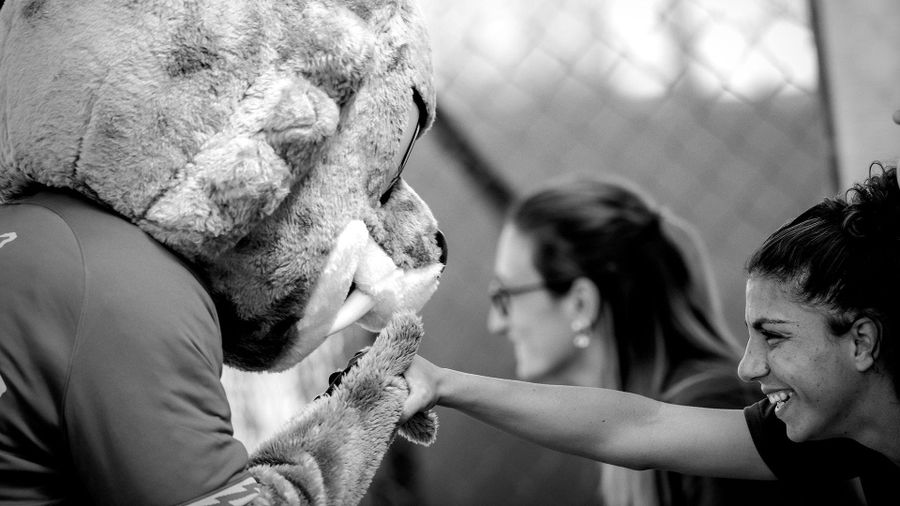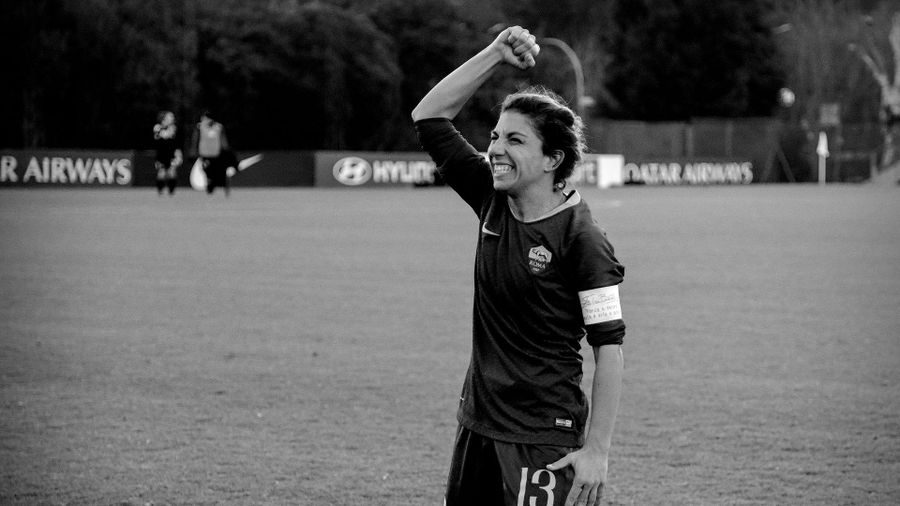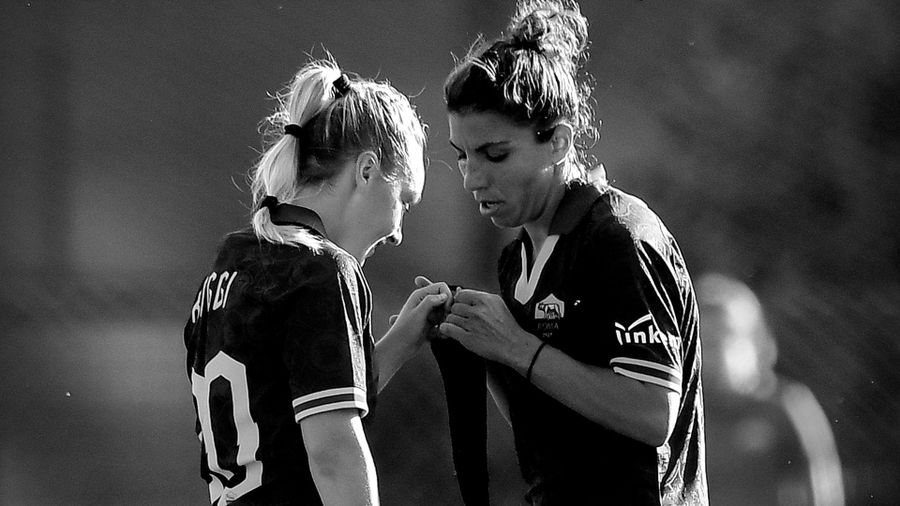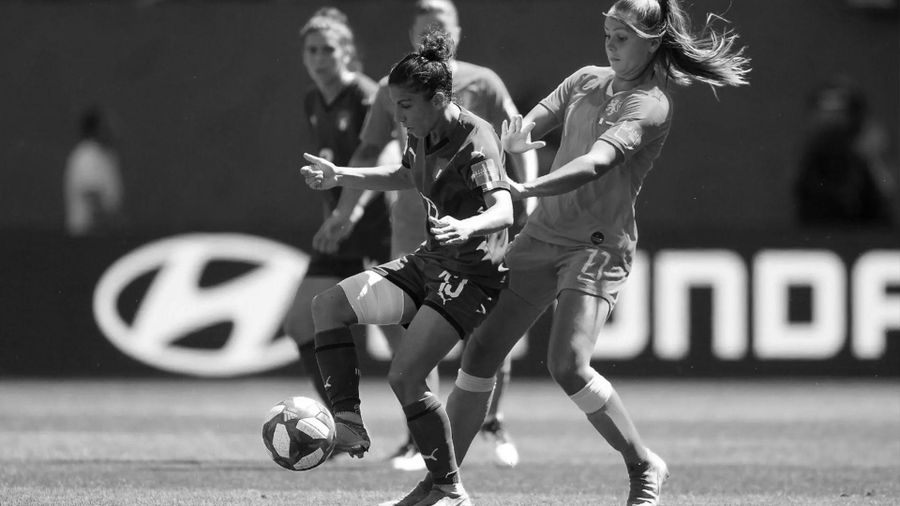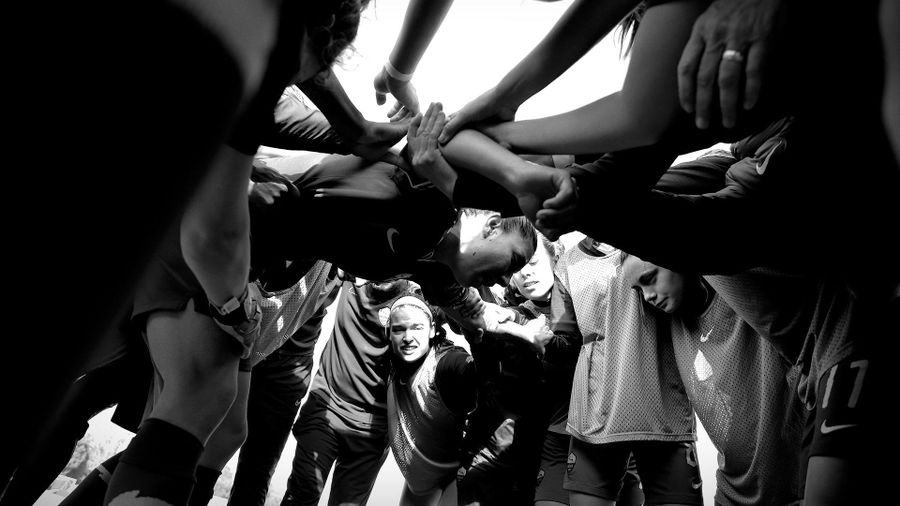

Having already won league titles and earned international recognition, in the summer of 2018 Elisa Bartoli answered the call home - returning to Rome to lead the club she supported as a child in its first foray in women's football.
A talismanic figure within the squad ever since, Bartoli - along with coach Betty Bavagnoli - has helped set the tone for the Giallorosse in the season and a half of setbacks and success that has followed.
In our latest Big Interview, the 28-year-old reflects on a career that has taken from playing alongside boys at junior level all the way to the quarter-finals of last summer's Women's World Cup...
What were you like as a child?
“I was reserved and shy and I had difficulty relating to others. I was quiet and I kept everything to myself – I couldn’t even talk to my parents. I still tend to keep things to myself now, albeit a bit less than before.”
Do you have any brothers or sisters?
“Yes, I have a sister who’s eight years older than me. So basically she had her life and I had mine – we still had a few arguments at home, though! Because of the age gap, I was closer to my cousin Simone, who is a year older. He was born on 8 May and I was born on 7 May so we used to celebrate our birthdays together at my nan’s house. I spent more of my childhood with him than with my sister.”
What part of Rome did you grow up in?
“Ponte Milvio. I basically grew up in the courtyard at my nan’s house. I used to love Sunday lunches at her place. After school we’d go there to play football from 5 o’clock to half past seven, then my mum would come down and drag me back home – otherwise I’d have stayed there and kept playing till late.”
Did you play football at school too?
“Yes. Even at primary school I’d play football with the boys– I’ve always loved football. The main place was the courtyard at my nan’s., thought. We played there with older kids. I was the youngest and they used to put me in goal at the start – you can imagine how many times I got hit by the ball!”
So it was with your cousin that you started playing football?
“Yes, if I made it in the game it’s partly thanks to him because he used to play for Nuova Milvia and I would always go to his training sessions and matches. One time they were a player short in training and my cousin suggested to the coach that I could come in. I was put in central defence. I was eight or nine at the time and they asked me to play for them after that.”
How did the other kids react when you asked to play with them?
“It wasn’t easy at the start because I was a girl. Once they saw that I could play a bit and that I didn’t give up they changed their minds and realised I could hold my own. The best times were when our courtyard lot played against the kids from the church – with Coca Cola as the prize! We would make jokes about us being the underdogs because we had a girl on our team but it was great fun when we won.
“They always respected me though. It was only people who didn’t know me who would sometimes call me a tom boy or things like that. I never had any problems at Nuova Milvia – I was actually made captain there. They all liked me and I was really happy. It was our opponents and their parents who occasionally created awkward situations. You can’t do much to change ignorant people unfortunately. Children tend to be pure in that sense and they don’t see any difference. It’s the things you hear from the parents that create prejudices and affects the way people behave.”
How long did you stay at Nuova Milvia for?
“Until the age of 14. In my last match the coach subbed me off and my team-mates’ parents unfurled a banner which said, ‘Best of luck to our invincible captain.’ They wrote me a lovely letter too which I still have to this day.”
When did you first join a women’s team?
“I joined Roma CF thanks to Giampiero Serafini. They were playing in Serie B at the time. My first match was a Coppa Italia derby against Lazio and I played in central midfield.
“The switch to women’s football was strange at the start because I was used to playing hard – you had to go in hard against the boys or you risked getting hurt. I used to ache all over after every game. I was booked three times in my first three matches. We had a great team though and within three years we got promoted to Serie A. Gioia Masia was in that team and she was a role model for me, my idol. I rigidly followed every piece of advice she gave me. She won loads in her career and she was an extremely graceful player.”
Who was your male role model?
“Cafu. How could you not love him after those three sombreros on [Pavel] Nedved? Another player I admired a lot was Alessandro Nesta and his amazing sliding tackles, even though he did play for Lazio.”
Did you go to watch Roma?
“My dad often took me to the stadium but what I liked most was when we all got together with my uncles, aunts and cousins to watch the game at home. There were a dozen or so of us and we made a tremendous racket! Those are my fondest memories. When we lost there was an eerie silence but when we won we’d trash the house. Brilliant.”
What was the first match you saw at the Olimpico?
“I was young. I think it was a game against Parma but I can’t remember the score. I just remember seeing the whole stadium decked out in yellow and red. I remember the anthem, the flags, everyone standing up and signing. That’s what stuck in my mind – the way Romans get behind their team, the energy and the colours. It was a like a party.”
Getting back to your career, you left Roma aged 21 and joined Sassari Torres.
“Yes, I joined what is still the most successful club in Italy. I had to leave home because Roma CF went bankrupt. Either I stayed in Serie C or I went elsewhere. It wasn’t easy to leave Rome. I moved to Sassari, where I knew no one. It was on the other side of the sea, which meant taking a plane or boat to go home. I cried the first night. I got through it by telling myself to be strong and just get through that first year then see what happened. But then I fell in love with Sardinia and its sea and it changed my life. Training in the sun in the afternoon, it was a totally different life – at Roma CF we always trained in the evening. It was a sort of introduction to the professional game. There were other problems though, like wages not coming through, but thankfully my family always helped me.”
What was it like travelling to away games from Sardinia?
“They were… interesting. Apart from the really big games – like against Brescia or Tavagnacco – we would get up at 4 am and take a plane from Alghero at 6:30. When we landed, we’d have a look round the shops at the airport then go straight to the match with no rest, before flying back in the evening. Yet we still managed to win a Scudetto and Super Cup in 2013. That’s when I got my first Italy call-up too.”
Was that when you realised you’d become a top-level player?
“Yes, it was at Torres that I really improved the mental side of my game and became hungrier for success. Manuela Tesse was my coach and she was a great player herself. We had a love-hate relationship because she’d slaughter me at times but she thought very highly of me too. She was a defender and she taught me a lot. I was also playing with the likes of Betta Tona, Patrizia Panico, Daniela Stracchi, Silvia Fuselli, Giorgia Motta, and all my other team-mates.”
After Torres, you spent a year at Mozzanica. What was that like?
“It didn’t go well. The club treated me very well but I really struggled with the climate. Going from the sea of Sardinia to the cold north was tough. After that I had a really nice time at Fiorentina. I fell in love with Florence. I matured there and won another Scudetto. The fact that it was the club’s first title made it even better. Fiorentina were the first professional club to have a women’s team and I made lots of friends there that I’m still close to, like Alia Guagni, who I room with on Italy duty. It was a tough decision to leave but the alternative was Roma so my heart decided for me. I came home seven years on.”
When did you realise coming to Roma was a real possibility?
“The rumours started in February but I ignored them out of respect for my team and so as not create false hope. I was contacted at the end of the season and it didn’t take much to convince me. My only doubt was that the World Cup was coming up the following summer. But I don’t like jumping on a train halfway through the journey – I prefer to get on at the start. Rome is my home and winning the Scudetto here would be like winning 10 elsewhere. The club had big plans too and they’re working very hard on them.”
What’s it like being captain?
“When they first suggested it, it took me a while to get used to the idea because of my character: I’m introverted, don’t speak much and have difficulty interacting with people. I did a lot of soul-searching, wondering whether I was up to the job and in the end I convinced myself I was. I have plenty of experience, heart, passion and grit and I thought I could convey that to my team-mates so I accepted. I also saw it as an opportunity for my personal development. It was a dream true: to be the captain of Roma, my favourite team and hometown club.”
How do you feel about being part of a generation that is experiencing sweeping changes in the women’s game?
“What drives it all is passion. You finish training at 10 pm, get home at 11 then get up at 6 am to go to school or do a job at the same time. If I wasn’t so passionate about football, I wouldn’t have left my city and my family. I wouldn’t have accepted being paid for 10 months in three years. What made me keep going was the hugs with my team-mates, the tears in my dad’s eyes when he took the ferry to come to Sassari and see me win the Scudetto. All those sacrifices and all that joy are still a part of me. Fortunately it’s easier for girls nowadays. There are better facilities and organisation and the clubs are stronger. Before we had the desire but not many opportunities. The women’s game is getting a bit closer to the men’s now but we mustn’t lose values like self-sacrifice, humility and determination.”
How do you feel about being a role model for girls looking to make it in the game?
“I get lots of messages from girls who say they see me as an example and it’s such a nice feeling but it’s also a big responsibility. I receive such lovely letters I sometimes get goose bumps. I see it as reward for all the sacrifices I made.”
And what do you think of the new generation of female players?
“Judging by what I’ve seen from the girls at our football school and the U19s – who are really very good technically and tactically – they’re a lot further ahead than we were at their age. I hope we don’t sacrifice creativity for the sake of physical and tactical aspects, though – like in the men’s game, where physicality is becoming more important and it’s increasingly rare to find flair players like Roberto Baggio, Francesco Totti, Ronaldinho and Ronaldo.”
What’s your relationship like with Betty Bavagnoli?
“We have a great relationship – there’s mutual respect and friendship. I’ve never known such a tranquil person. Even when she gets angry, she maintains an air of elegance. I’m more impulsive by nature but as soon as she says, ‘Elisa, relax’, I rein in my instinct. We talk a lot and that’s really important in a team. I’m delighted to have a coach like her and I hope we’ll be able to keep working together for a long time.”
What are your best memories from the World Cup last year?
“There are lots. The first was when I was substituted against Brazil and I had to walk around the pitch to get to the dugout. Lots of people stood up to applaud me – that was one of the best moments of my life. I didn’t expect it and I’ll never forget it.
“The end was nice too. We lost to Holland but we realised what we’d achieved. We were one of the best eight teams in the world and the only side with amateur players.
“I also remember when I got the call from my brother-in-law and my parents and they told me about all the expectation there was back in Italy before our matches. It made me think back to what it was like for me as a fan during the men’s World Cup.
“Another thing I’ll never forget is all the people who wrote to me – young girls, men, old ladies. It’s wonderful to think that we managed to unite the country.”
How did you feel before the first match?
“That’s another moment I’ll never forget: my first World Cup at the age of 28. When I came on against Australia we were losing 1-0. My heart was racing and I thought to myself: ‘I’m gonna go out there and leave my mark on this game!’ Winning in the 90th minute was a feeling I can’t put into words. I couldn’t sleep that night because my mind kept going back to the game, the messages I got, the hugs and smiles, the singing on the bus back. It was amazing.”
Getting back to now and this period of isolation, what do you miss about normal life?
“Everything. I miss going to the bar for a coffee. I miss my family, my dog, my friends. I miss playing football, laughing, joking and grafting with my team-mates. I miss the smiles and the looks in other people’s eyes. I miss freedom.”
How do you spend the day? Do you have a personalised training programme?
“Yes, we’re given training schedules. This week we’ve done double sessions except Sunday when we just have one. We get sent videos too to show us how to do the physical and technical exercises properly, and clips of matches to watch. I’m using every nook and cranny of my house to train and keep in shape.”
What’s your overall assessment of this first year and a half at Roma?
“We’ve definitely improved over the last year and the interruption possibly came at the worst time for us because we were in a really good place in terms of our organisation, playing system and understanding.
“I hope we can pick up again from where we left off as soon as possible – if it’s safe to do so, obviously. We’re still in the mix for second place and we’re still in the Coppa Italia. We have goals throughout the team as well and that tells you the sort of football we play. There’s a fantastic team spirit within the squad as well – we all pull our weight to help the others. We have to keep doing what we’re doing and keep improving.”
Check out earlier entries in our Big Interview series:
AS Roma x Betty Bavagnoli
AS Roma x Chris Smalling
AS Roma x Edin Dzeko
AS Roma x Gianluca Mancini
AS Roma x Aleksandar Kolarov
AS Roma x Nicolo Zaniolo
AS Roma x Jim Pallotta
AS Roma x Cengiz Under
AS Roma x Paulo Fonseca
AS Roma x Leonardo Spinazzola







 Shop
Shop

















